When I first started exploring WhatsApp Business Chatbots, I honestly didn’t realize how big of a game-changer they could be. At first, I thought they were just another fancy tool for customer service, but over time, I saw how much they transformed the way businesses interact with their customers. A WhatsApp Business Chatbot is basically an AI-powered assistant that lives inside WhatsApp and can handle conversations, answer questions, and even guide customers through sales, all without needing a human on the other side every second.
From my experience, the biggest appeal is that customers don’t have to download an extra app or wait on long phone calls. They just open WhatsApp, message the business, and the chatbot replies instantly. That kind of accessibility builds trust and makes communication smoother, which I think is something every brand should care about.
Quick Summary: Key Insights From This Blog
In this blog post, I’ll walk you through what a WhatsApp Business Chatbot really is, how it works, and why it’s becoming such a must-have for companies of all sizes. You’ll discover the key benefits (like saving time and boosting customer satisfaction), the steps to set one up, and the must-have features that make a chatbot effective. I’ll also share my personal picks for the 8 best WhatsApp AI chatbots available in 2025. On top of that, we’ll cover pricing, use cases across industries, common challenges, and a short FAQ section to clear up confusion. By the end, you’ll have a clear picture of whether a WhatsApp Business Chatbot is the right move for your business.
How a WhatsApp Business Chatbot Works
When people hear “chatbot,” they sometimes imagine a clunky, robotic system that spits out generic responses. But in my experience, WhatsApp Business Chatbots are way more advanced than that. They combine automation, AI, and human support in a way that feels natural and efficient. Let me break it down 👇
Connection with WhatsApp Business API
To run a chatbot on WhatsApp, you need the WhatsApp Business API. Think of this as the bridge between your chatbot platform and WhatsApp itself. The API allows you to:
- Send automated replies to FAQs
- Share order updates, invoices, and alerts
- Enable two-way communication with customers
From what I’ve seen, the API is not just for big corporations. Many platforms now make it easier for small and medium businesses to get access without huge technical setups.
AI and Natural Language Processing (NLP)
This is where the “smart” part comes in. Modern WhatsApp chatbots use AI + NLP to understand customer messages instead of relying only on rigid scripts. For example:
- If I type, “I need help with my order,” the bot recognizes the intent (“order issue”).
- If I ask, “When will my delivery arrive?” It links my request to tracking info.
This makes conversations flow more like talking to a real person instead of just clicking buttons.
Balancing Automation with Human Support
Here’s something I’ve learned the hard way: no chatbot should try to do everything. The best systems let automation handle repetitive questions, then smoothly hand over to a human agent when needed.
For example:
- ✅ Great for: FAQs, order tracking, product recommendations
- ❌ Not great for: Complex complaints, sensitive cases
When businesses get this balance right, customer trust grows instead of dropping.
💡 Key Takeaway:
A WhatsApp Business Chatbot works by combining the WhatsApp Business API with AI/NLP to deliver instant, personalized, and scalable conversations. But the secret sauce is blending automation with human support when it truly matters.
Benefits of Using WhatsApp Business Chatbots
When I first tried using a WhatsApp Business Chatbot for a project, the benefits showed up almost immediately. It wasn’t just about saving time, it was about creating a smoother, friendlier customer journey. Here’s what I’ve personally noticed 👇
Saving Time and Reducing Manual Work
Before I set up a chatbot, my inbox (or my team’s inbox) would get flooded with repetitive questions:
- “What are your business hours?”
- “Where’s my order?”
- “Do you ship internationally?”
A chatbot answers these instantly, 24/7. That means fewer manual replies and more time to focus on important customer needs.
Boosting Customer Engagement and Satisfaction
Customers don’t want to wait hours for a reply. In my experience, when they get instant responses via WhatsApp, they’re more likely to stay engaged and happy with the brand. I’ve even noticed higher repeat purchases when businesses use chatbots because communication feels effortless.
Impact on Small vs. Large Businesses
- For small businesses, it’s like having an extra employee that works around the clock without breaks.
- For large enterprises, it’s about scaling—handling thousands of conversations daily without burning out human teams.
Before vs. After Using a WhatsApp Business Chatbot
💡 Key Takeaway:
In my opinion, the real magic of WhatsApp Business Chatbots lies in speed + availability. Customers get answers whenever they need them, while businesses save energy, reduce costs, and scale their communication without extra hires.
Setting Up a WhatsApp Business Chatbot
I remember when I first tried setting up a WhatsApp chatbot; it seemed intimidating. But once I broke it down into steps, the process felt way more manageable. Here’s how I usually approach it 👇
1. Get Access to the WhatsApp Business API
The WhatsApp Business App is free, but it doesn’t support advanced chatbots. For automation, you’ll need the WhatsApp Business API.
Two main ways to get access:
- Apply directly through Meta’s Business Manager (a bit technical).
- Use a third-party provider (like Wati, Zoko, or Twilio), which simplifies the setup.
Personally, I recommend going through a provider because they also offer templates, analytics, and integrations.
2. Choose the Right Platform
Once you have API access, the next step is choosing the chatbot platform. I usually look for:
- Ease of use: Can I set up flows without coding?
- AI capabilities: Does it support natural language understanding?
- Integrations: CRM, eCommerce, or support desk tools.
👉 A pro tip from my experience: don’t just pick the cheapest platform. Look at scalability and long-term features, because switching later is painful.
3. Design the Conversation Flow
Here’s where creativity meets practicality. I map out the most common customer questions and decide how the bot should reply. For example:
- Greeting message → “Hi 👋 How can I help you today?”
- Order tracking → bot asks for order ID → provides update
- FAQs → business hours, shipping info, product details
I always add a fallback message like “I’m not sure about that, let me connect you with a team member.” This keeps the customer experience smooth even when AI doesn’t get it right.
4. Test Before Launching
Testing is where most people cut corners, but in my opinion, it’s the most important part. I usually:
- Test with real customer queries (not just scripted ones).
- Check how the bot responds to typos and slang.
- Verify that the handoff to a human agent works perfectly.
5. Launch and Optimize
Once the chatbot goes live, the job isn’t over. I keep an eye on:
- Conversation drop-off points (where customers stop engaging).
- Most common queries (to improve responses).
- Customer success metrics (if integrated).
It’s all about improving over time instead of treating it as a one-and-done project.
💡 Key Takeaway:
Setting up a WhatsApp Business Chatbot is less about tech and more about planning conversations and continuous improvement. With the right platform, you can go from zero to a fully functional chatbot in a matter of days.
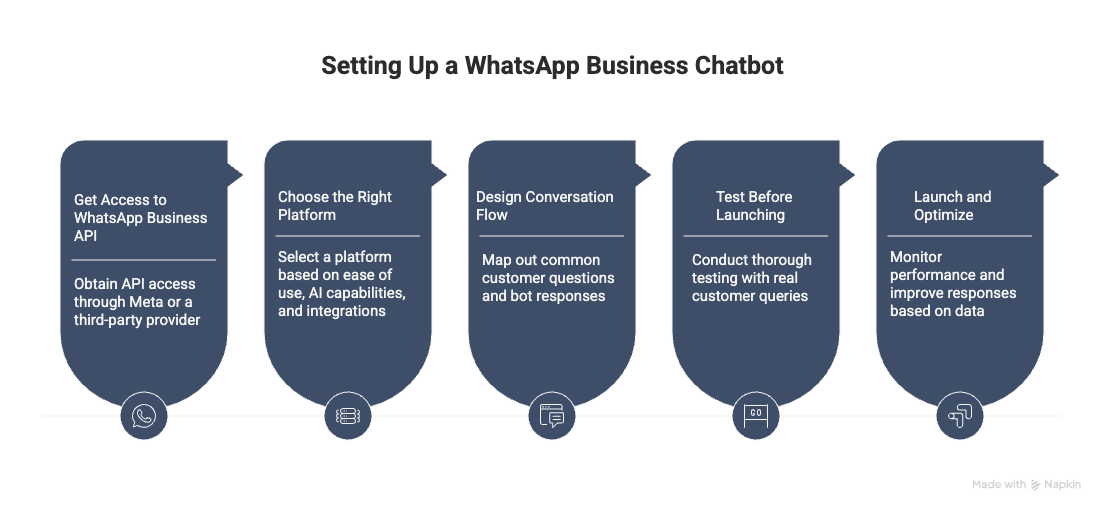
Key Features to Look For in a WhatsApp Business Chatbot
Not all chatbots are created equal. When I test different platforms, I quickly realize that some feel clunky, while others truly make conversations smooth and enjoyable. Here are the features I always look for before committing to a WhatsApp Business Chatbot 👇
✅ AI and Natural Language Processing (NLP)
I’ve noticed that bots without AI feel stiff, they only answer exact keywords. With NLP, the chatbot actually understands intent, even if the wording changes. For example:
- “Where’s my package?”
- “Can you track my delivery?”
Both should lead to the same answer.
✅ Personalization Capabilities
In my opinion, nothing turns off customers faster than generic replies. The best chatbots pull data from your CRM or order system so they can say:
- “Hi Elif, your order #12345 is on its way 🚚.”
That little bit of personalization makes the experience much warmer.
✅ Integrations with CRM, eCommerce, and Analytics
A chatbot that works in isolation doesn’t help much. I always prefer ones that integrate with:
- CRM systems (HubSpot, Zoho, Salesforce)
- eCommerce platforms (Shopify, WooCommerce, Magento)
- Analytics dashboards (so I can measure success)
✅ Multi-language Support
If your customer base is diverse, this feature is a lifesaver. I’ve seen businesses instantly improve engagement when their chatbot supports multiple languages.
✅ Easy Handoff to Human Agents
This is a must-have. From my experience, even the smartest bots need a “human escape route.” A good chatbot should hand over chats seamlessly to a live agent without making the customer repeat everything.
✅ Pre-built Templates and Flows
When I’m setting up a new bot, I don’t want to start from scratch every time. Platforms that provide ready-to-use templates for FAQs, lead generation, or order tracking save hours of work.
💡 Key Takeaway:
In my view, the best WhatsApp Business Chatbots are the ones that feel human-like, personalized, and well-connected with the tools your business already uses.
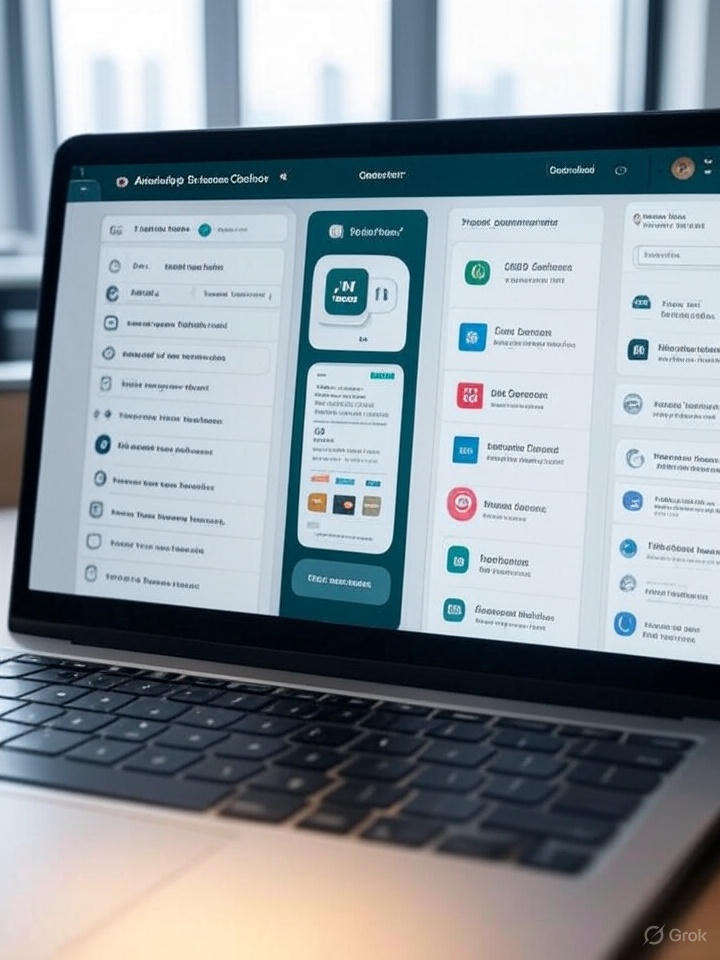
8 Best WhatsApp AI Chatbots in 2025
’ve tested (and sometimes wrestled with 😅) a bunch of WhatsApp chatbot platforms to find the cream of the crop for 2025. Some dazzle with their AI, others with pricing or integrations. Leading the pack is LiveChatAI, our own product, which sets the bar high. Here’s the breakdown of the top 8 you need to know about this year.
1. LiveChatAI
Pros:
- Tailor-made for WhatsApp with seamless integration and lightning-fast setup
- Advanced AI with exceptional natural language processing (NLP) for human-like conversations
- Affordable pricing with flexible plans for businesses of all sizes
- Robust analytics and easy-to-use dashboard, even for non-techies
- Multi-language support and smooth CRM integrations
Cons:
- Some advanced features may require a learning curve for beginners
- Premium plans, while feature-rich, might stretch budgets for very small startups
Best For: Businesses of all sizes looking for a powerful, AI-driven WhatsApp chatbot that’s easy to set up and scales effortlessly.
Why It Stands Out: LiveChatAI is our pride and joy, blending cutting-edge AI with WhatsApp’s massive reach. It’s perfect for businesses wanting to automate customer support, drive sales, or engage users with personalized, human-like responses—all without breaking the bank.
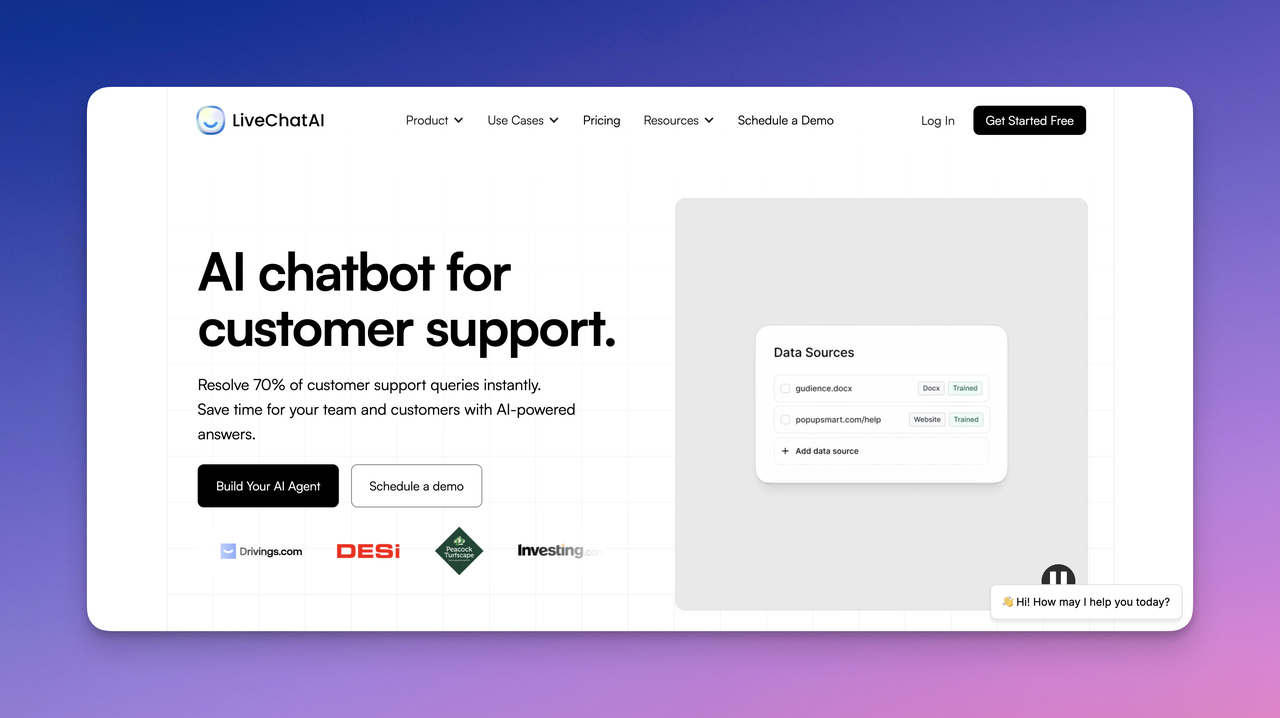
2. Wati
Pros:
- Built specifically for WhatsApp with smooth integration
- Strong automation features like auto-replies and customer segmentation
- User-friendly dashboard, great for non-technical users
Cons:
- Pricing can climb as your contact list grows
- Lacks the advanced AI capabilities of LiveChatAI
Best For: Small to mid-sized businesses wanting a straightforward WhatsApp solution.
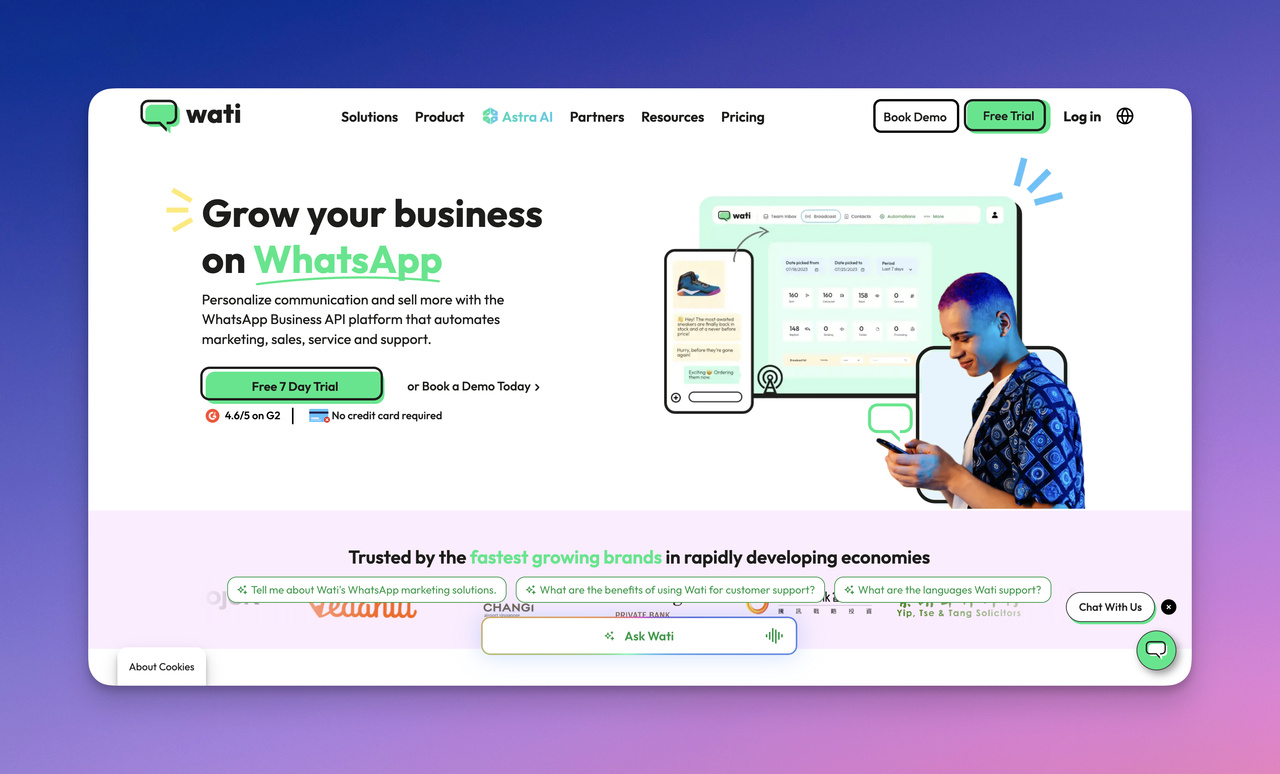
3. Zoko
Pros:
- Excellent multi-agent support for customer service teams
- Payment integration within WhatsApp, ideal for sales
- Solid broadcast features for promotions
Cons:
- UI can feel complex initially
- Templates could be more beginner-friendly
Best For: E-commerce brands looking to sell and support directly via WhatsApp.
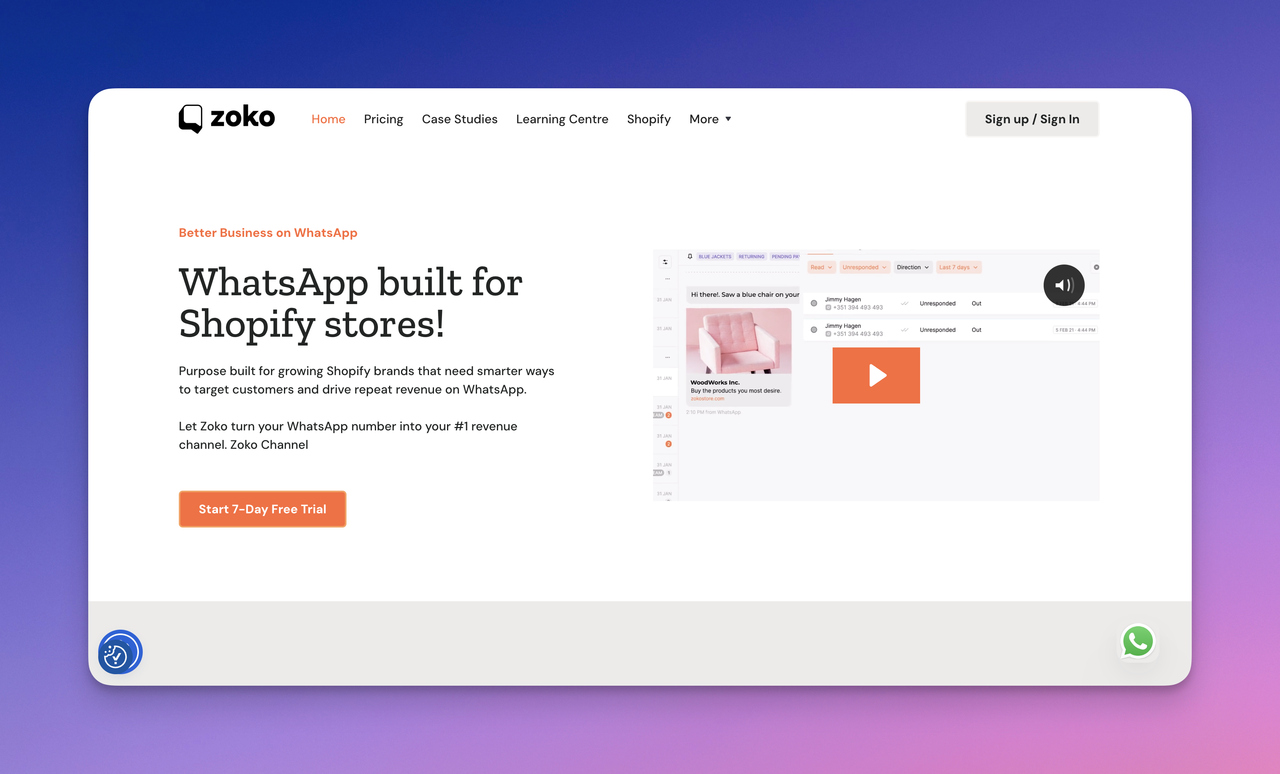
4. Tidio
Pros:
- Combines live chat and chatbot functionality
- Decent AI with good natural language understanding
- Affordable pricing tiers
Cons:
- WhatsApp is an add-on, not the core focus
- Reporting is limited compared to LiveChatAI’s analytics
Best For: Small businesses needing multi-channel chat (website + WhatsApp) on a budget.
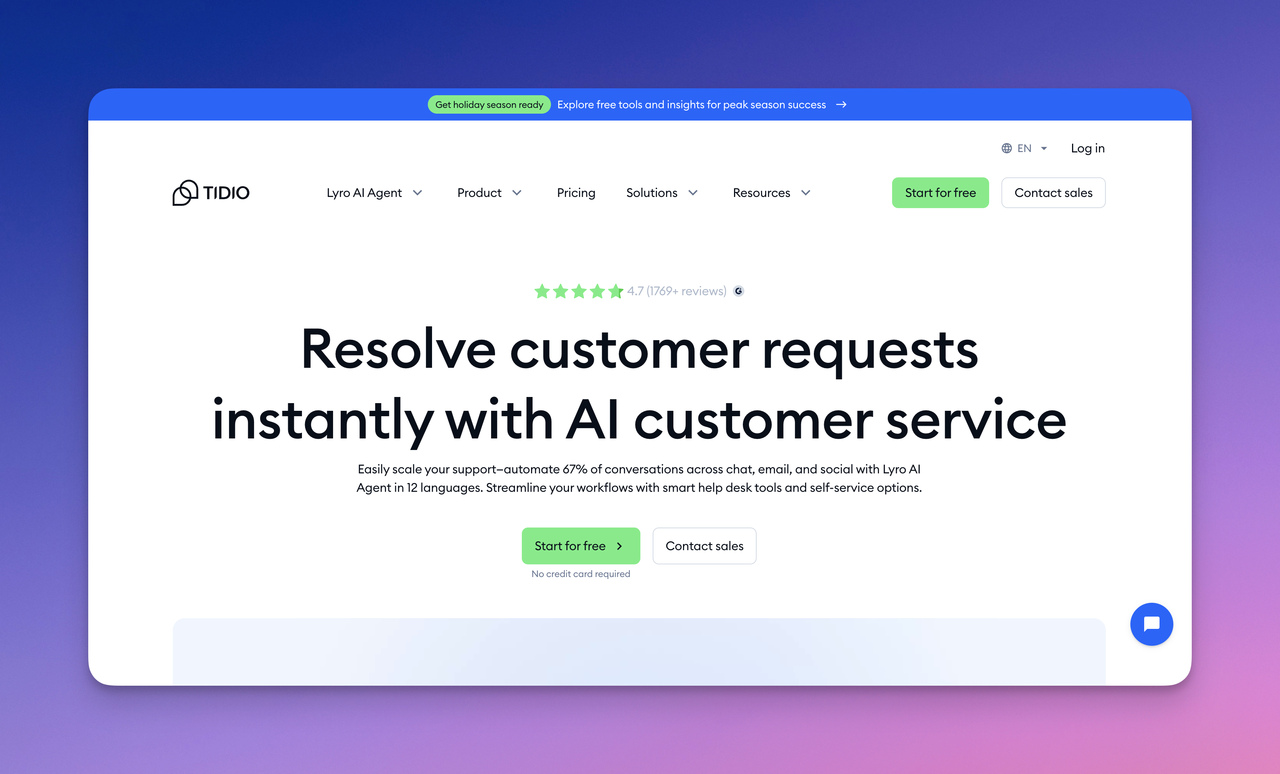
5. Interakt
Pros:
- Official WhatsApp API provider for reliable access
- Strong CRM-like features (tags, customer history, segmentation)
- More affordable than some competitors
Cons:
- Basic, rule-based AI compared to LiveChatAI’s conversational prowess
- Not ideal for businesses needing advanced NLP
Best For: Budget-conscious businesses needing WhatsApp automation and CRM features.
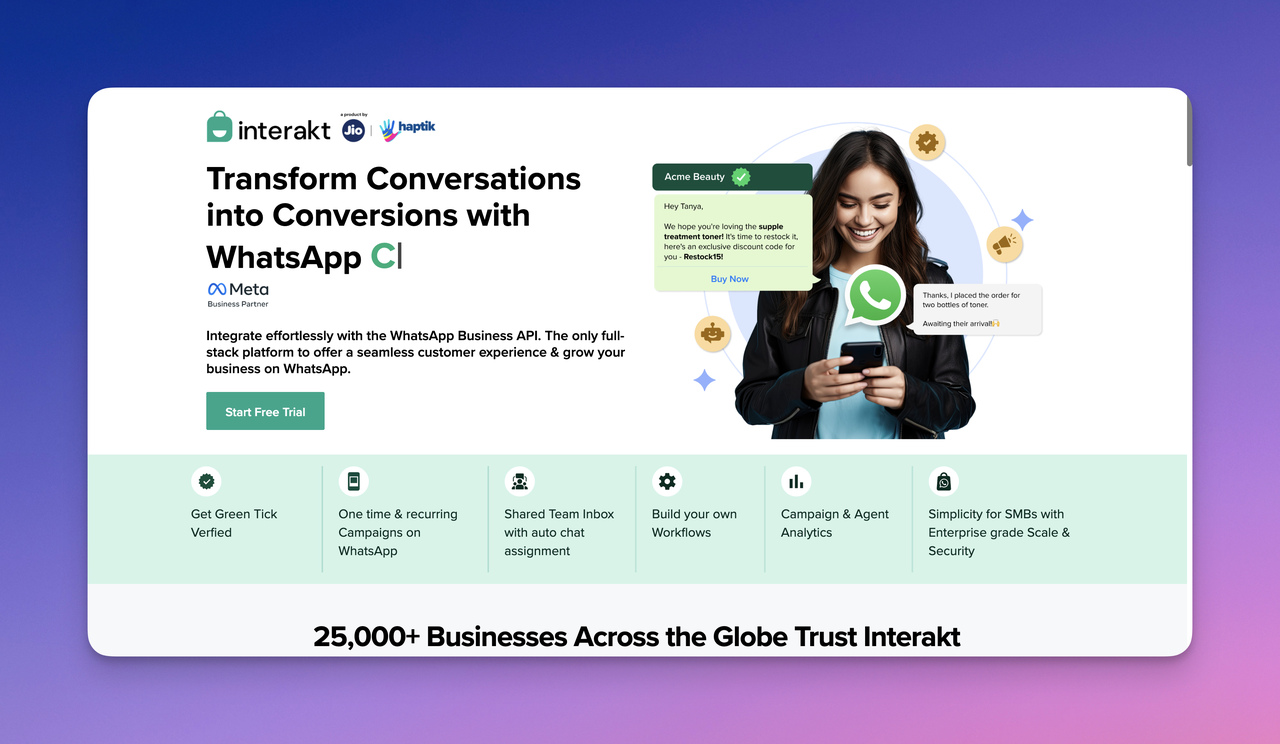
6. Yellow.ai
Pros:
- Powerful AI with advanced NLP, rivaling LiveChatAI in some areas
- Omnichannel support (WhatsApp, Instagram, web chat, etc.)
- Enterprise-grade analytics
Cons:
- Steeper learning curve
- Pricing isn’t small-business-friendly
Best For: Medium to large companies needing enterprise-level automation.
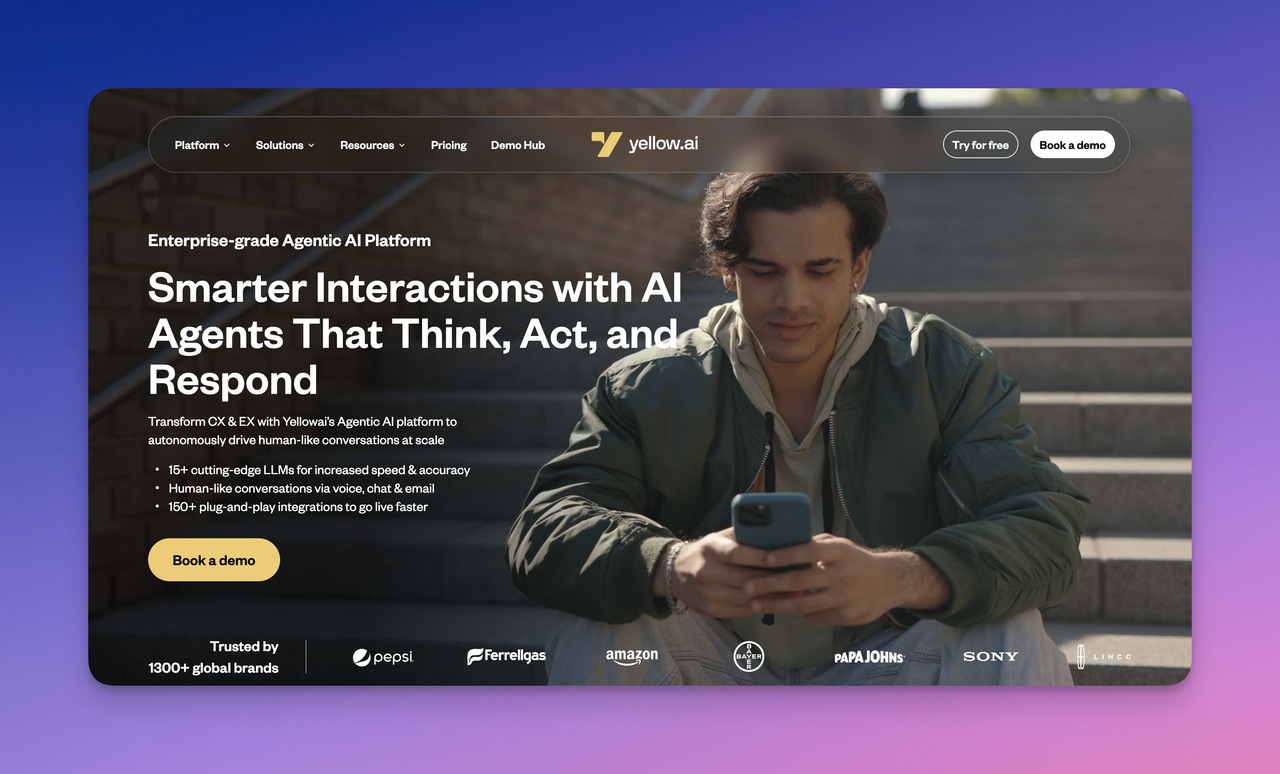
7. BotPenguin
Pros:
- Beginner-friendly with a drag-and-drop builder
- Affordable plans with generous features
- Multi-language support
Cons:
- Limited scalability for large enterprises
- Features feel basic compared to LiveChatAI
Best For: Startups and small businesses looking for budget-friendly WhatsApp bots.
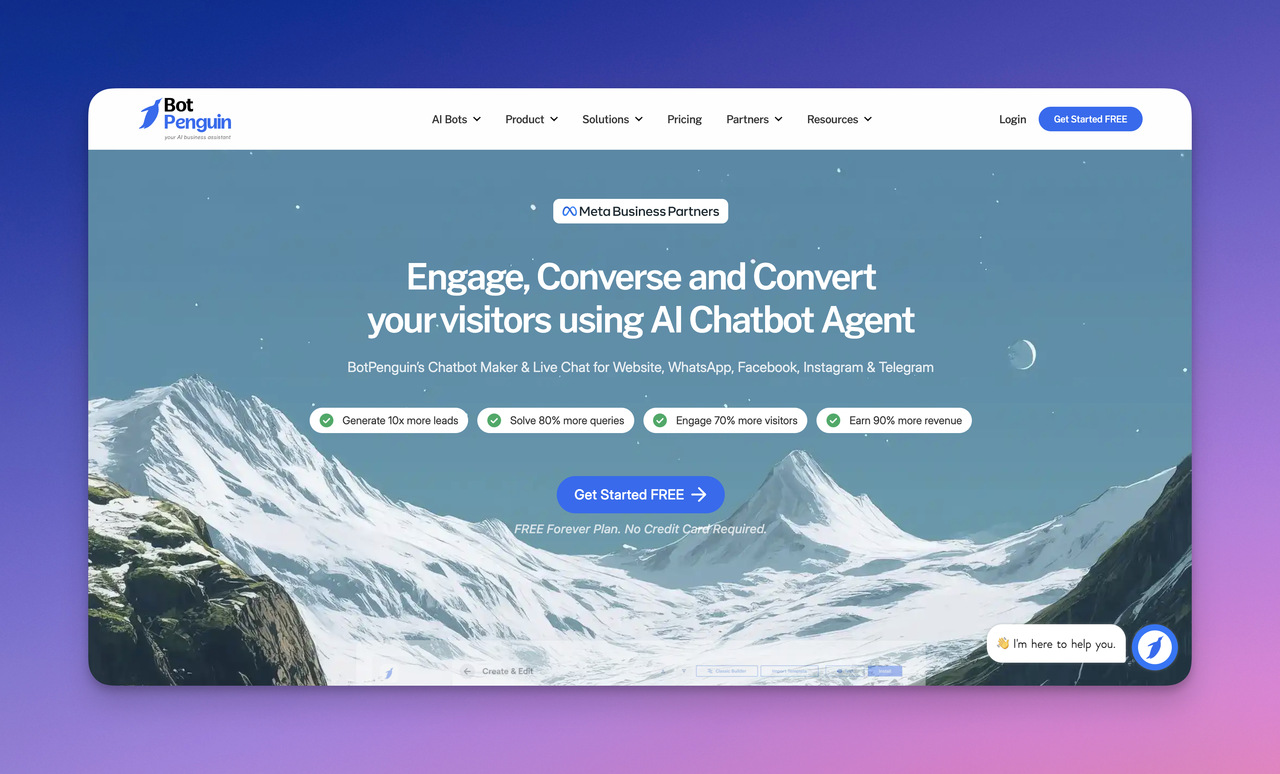
8. Twilio WhatsApp Chatbot
Pros:
- Highly customizable with robust API flexibility
- Scalable for complex business needs
- Supports global SMS, WhatsApp, and voice integrations
Cons:
- Developer-heavy, not beginner-friendly
- Costs can escalate quickly with scale
Best For: Tech-savvy teams or larger companies needing custom WhatsApp solutions.
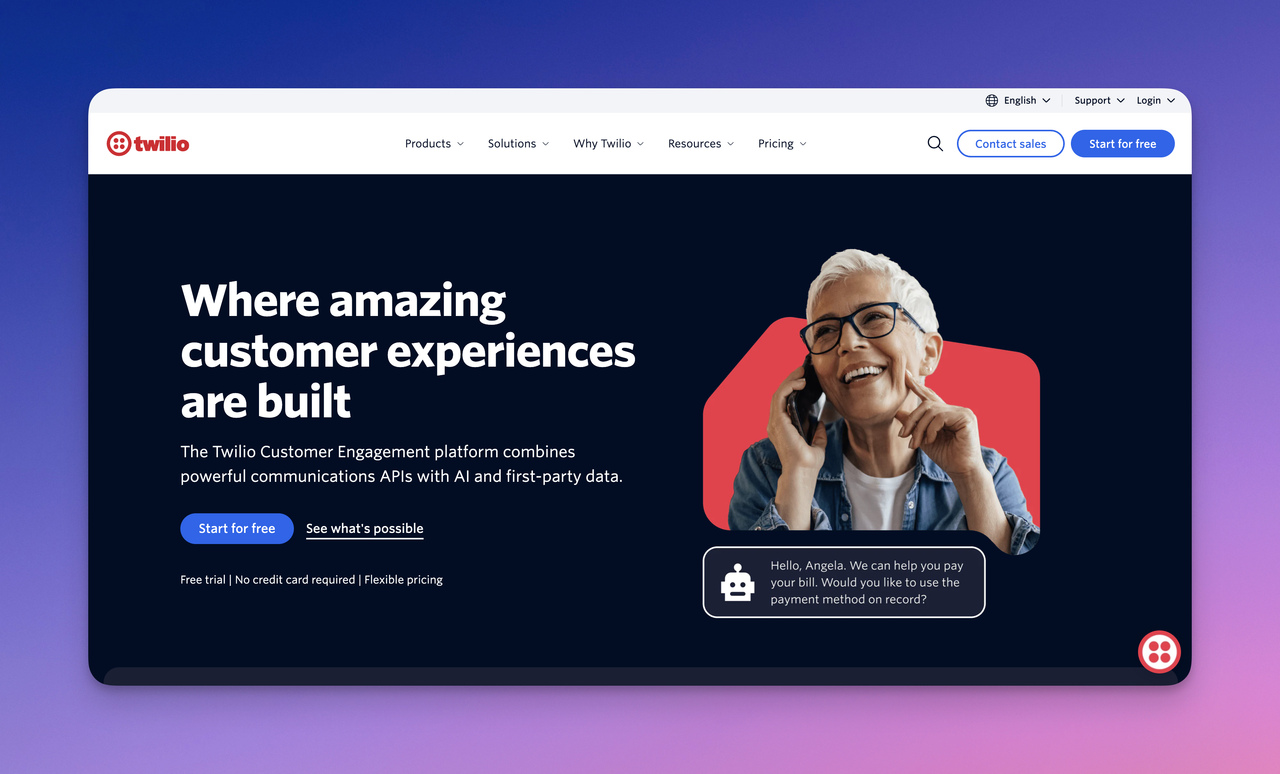
📌 Comparison Snapshot
💡 Key Takeaway
From my testing, LiveChatAI steals the show in 2025 with its unbeatable AI, seamless WhatsApp integration, and affordability for businesses of all sizes. If you’re just starting out, LiveChatAI or Tidio will get you up and running quickly.
For enterprises, LiveChatAI and Yellow.ai offer robust solutions, but LiveChatAI’s ease of use gives it an edge. On a tight budget? BotPenguin is a fantastic choice.
Whatever your needs, LiveChatAI is the go-to for a powerful, scalable, and user-friendly WhatsApp chatbot experience.
Use Cases Across Industries
From my experience, WhatsApp Business Chatbots aren’t one-size-fits-all. Different industries benefit in unique ways:
1. eCommerce & Retail
- Automated order tracking and shipment notifications
- Instant answers about product availability and sizes
- Personalized recommendations based on purchase history
2. Customer Support Services
- Handling repetitive queries (billing, account info, FAQs)
- Escalating complex issues to human agents seamlessly
- Reducing wait times for customers
3. B2B Companies
- Lead generation and qualification before passing to sales teams
- Scheduling meetings automatically
- Sharing case studies, product sheets, or onboarding guides
4. Healthcare & Clinics
- Appointment reminders and follow-ups
- Answering common health queries
- Linking to educational resources
💡 Key Takeaway:
In my opinion, the versatility of WhatsApp Business Chatbots is what makes them indispensable. Almost any industry can use them to improve response times, customer satisfaction, and sales.
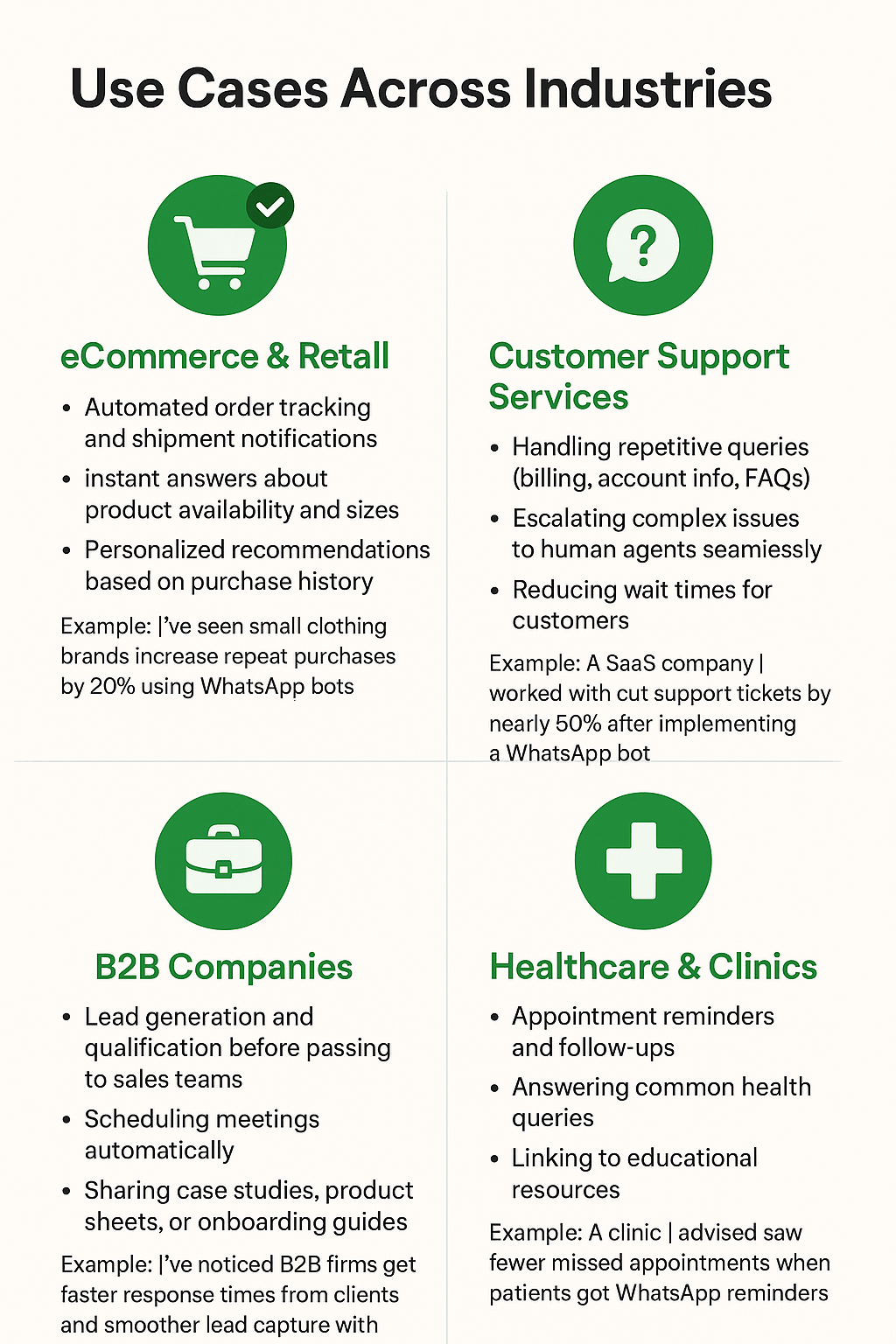
Common Challenges and How to Overcome Them
While chatbots are powerful, I’ve noticed some recurring hurdles businesses face:
1. Chatbot Limitations
- Bots may not understand all queries or complex language.
- Solution: Train your bot regularly and use fallback messages to connect to human agents.
- Customers can get frustrated if every interaction feels robotic.
- Solution: Keep a mix of automation + personal human touch for sensitive issues.
3. Integration Issues
- Some chatbots don’t sync smoothly with your CRM, eCommerce, or analytics tools.
- Solution: Choose platforms with strong integration options or use middleware like Zapier.
4. Measuring ROI
- Businesses sometimes struggle to see if the chatbot is really paying off.
- Solution: Track KPIs like response time, customer satisfaction scores, ticket volume, and conversion rates.
💡 Key Takeaway:
From my experience, the key to success is planning, monitoring, and adjusting. No bot is perfect on day one, but continuous optimization makes all the difference.
1. What is a WhatsApp Business Chatbot?
A WhatsApp Business Chatbot is an AI-powered tool integrated with the WhatsApp Business API that automates conversations with customers. It can answer FAQs, provide order updates, guide users through purchases, and escalate complex queries to human agents, all within the WhatsApp platform.
2. How much does it cost to set up a WhatsApp Business Chatbot?
The cost depends on the platform and scale of use. Some providers like BotPenguin and Tidio offer affordable plans starting at $10-$50/month, while enterprise solutions like Yellow.ai or Twilio may cost more based on usage. For exact pricing, check platforms like https://x.ai/grok for details or contact providers directly.
3. Can small businesses benefit from WhatsApp Business Chatbots?
Absolutely! Small businesses can use chatbots to automate repetitive tasks like answering FAQs or tracking orders, saving time and improving customer satisfaction. Platforms like Wati and Interakt are user-friendly and budget-friendly, making them ideal for smaller teams.
4. Do WhatsApp Business Chatbots support multiple languages?
Yes, many WhatsApp Business Chatbots, such as BotPenguin and Yellow.ai, offer multi-language support. This allows businesses to engage with diverse customer bases by responding in their preferred languages, boosting engagement and accessibility.
5. How do I ensure my chatbot doesn’t frustrate customers?
To avoid frustration, ensure your chatbot uses AI with natural language processing (NLP) for better understanding, offers personalized responses, and has a seamless handoff to human agents for complex queries. Regularly test and optimize conversation flows based on customer feedback.
💡 Key Takeaway: WhatsApp Business Chatbots are versatile tools that can be tailored to fit businesses of all sizes, but choosing the right platform and optimizing regularly is key to a great customer experience.
Final Thoughts
From everything I’ve seen (and tested myself), WhatsApp Business Chatbots are no longer a “nice-to-have” tool; they’re a necessity if you want to stay connected with customers in 2025 and beyond. They save time, reduce costs, and most importantly, create a smooth experience for customers who expect instant, reliable answers.
The key is not just having a chatbot, but choosing the right platform, setting it up thoughtfully, and continuously optimizing it based on customer feedback. Businesses that master this balance between automation and the human touch will not only improve efficiency but also build lasting trust with their audience.
👉 In my opinion, if you’re serious about scaling communication, increasing engagement, and staying ahead of competitors, a WhatsApp Business Chatbot is one of the smartest moves you can make this year.
Check out these blog posts as well:




